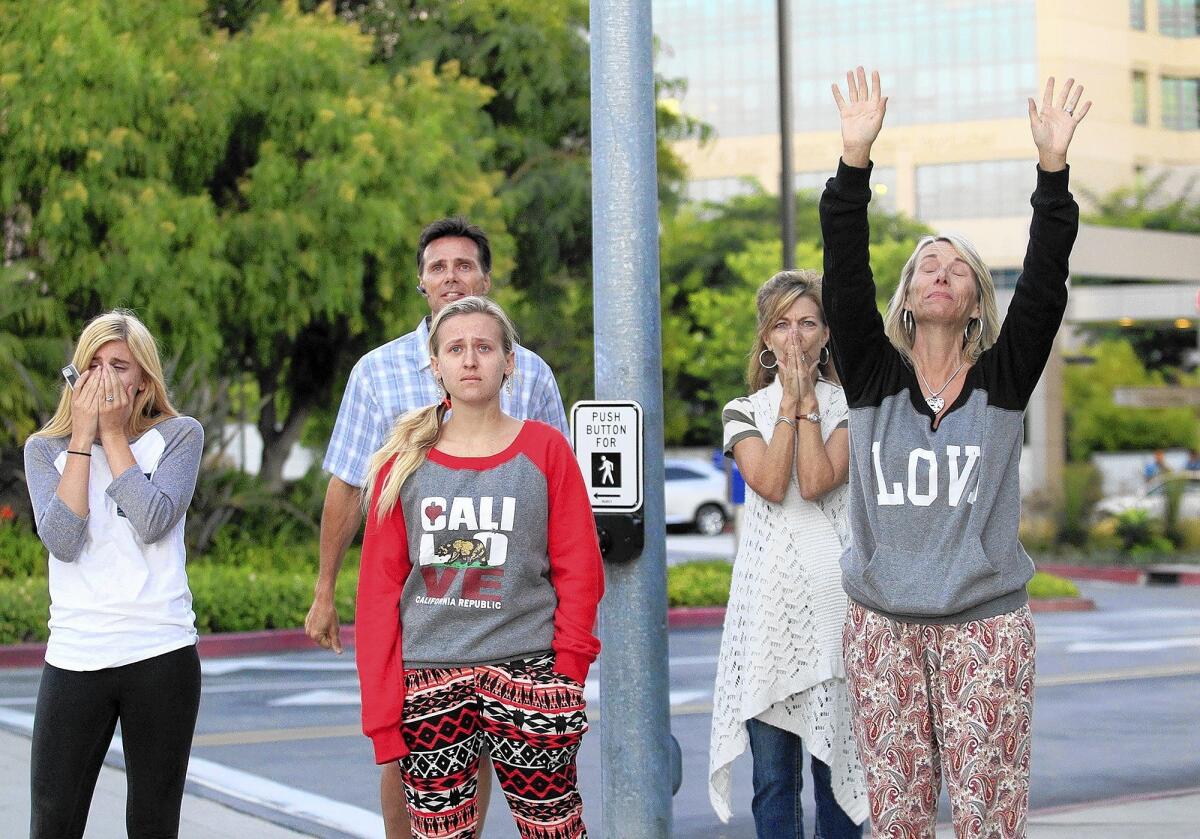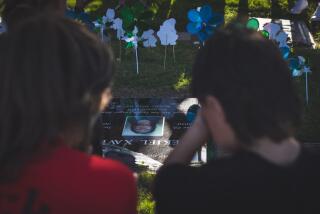Before his organ donation, a final loving vigil for their son

Veronica Eckhardt bent over the hospital bed, sponging paint onto the sole of her son’s left foot.
“Connor would not like what we’re doing,” she said.
Doctors had declared Connor Eckhardt brain-dead the day before, at age 19. Machines breathed for him in the Neuro Intensive Care Unit at Hoag Hospital in Newport Beach.
Veronica’s husband, Devin, held his son’s leg steady as she continued to apply a mixture of brown and blue, Connor’s favorite colors.
It was Thursday, July 17. Their son’s decision to donate his organs had allowed the couple extra time at his bedside. Tests needed to be run, organ recipients identified.
Earlier that day, Veronica thought of the footprints they made when Connor was little. She wanted to make another set, to commemorate his end. Her mother and father-in-law went to Michaels to buy the paint.
“Although his footprints will no longer be walking on the Earth, his imprints will still be there in so many people’s lives,” she said.
The clock ticked past 2 p.m. Connor’s organs were scheduled to be removed in two hours.
::
The previous Saturday night in Orange County, an otherwise healthy Connor had smoked “spice” with a friend.
Also called K2, spice is a synthetic form of pot that some experts say can overwhelm brain circuitry, leading to psychosis, kidney injury, high body temperature, heart attack or death.
Connor fell asleep. His brain, deprived of oxygen, began to swell.
His parents are certain Connor did not know the dangers of spice and succumbed to peer pressure and unknowingly made a fatal choice.
“Connor did not want to die,” his mother says. “Connor very much wanted to live. He had everything to live for.”
Chemicals in spice vary, as do their concentrations, making it difficult for users to know what they are smoking and how it might alter their brains, experts say.
Synthetic pot is illegal to sell in California, but shops still market it as potpourri or incense, police say, and its reputation as being legal and safe persists.
At the hospital, tests did not detect spice in Connor’s system. The ever-changing components make it difficult for scientists to develop a standard way to trace it. But the hospital found no sign of other drugs. And he had the small, square packet of spice still in his pocket.
::
When Connor decided to become an organ donor, his parents never imagined it would allow them four days with their son.
They arrived at his bedside midday Monday to find that he was already in a coma. But they would have time to take pictures. They could try to internalize his smell.
They could talk to him, trace the muscles in his arms, run their fingers through his hair.
On a Thursday afternoon, family and friends gathered around the comatose body in the gray, window-lit room. They filled the small space and spoke in low voices above the humming medical machinery.
Connor had a surfer’s golden skin, in sharp contrast to his mint green hospital gown, and his callused feet hinted at his love of snowboarding, wakeboarding and skateboarding.
Usually, he animated a room. Quick to get to know strangers, he was the type whom many considered their best friend, his mother said.
His father described him as tender-hearted and passionate, someone who lived life “all-in.” Connor taught himself to play the guitar in middle school. He tried new sports until he mastered them, placing in a surf contest in Hawaii just days after he learned to stand on a board.
Now he rested on a bed angled slightly upward, his arms and legs propped on pillows. His head leaned toward a teddy bear nestled above his right shoulder.
His mother painted the bottom of his opposite foot, and then both feet were pressed against a sheet of white paper. She examined the result.
“Oh, that’s perfect,” she said.
::
At nearly 2:20 p.m., Veronica and Devin embraced at their son’s side, exhausted and overcome with emotion.
Music streamed from an iPhone.
What can wash away our sin? What can make us whole again?
Raised in a Christian family, Connor once knew such lyrics by heart. His father, president of an insurance management services group, also had experience in ministry.
Nothing but the blood of Jesus.
Veronica sat in a chair next to her son, leaning her forehead on the bed.
“What time is it?” she asked, looking up to find the answer. “So we only have an hour and 40 minutes with him?”
Her lower lip curled down. Her right hand rested on Connor’s left.
The minutes ticked on.
“I just keep thinking he’s going to open his eyes and go, ‘What’s up, guys?’” she said.
She buried her head in his chest and cried.
::
Connor, or “CJ,” as he was nicknamed, was adopted by the Eckhardts the day he was born: Oct. 19, 1994.
“I knew I would do anything for him,” Devin would recall. “It was an amazing experience. At that moment, I fully and completely loved him.”
Connor’s two siblings were also adopted. Still, he wrestled with feelings of rejection, fear and abandonment, suffering from a “hole in his heart,” as his mother described it.
When he was 15 he went to a Christian boarding school in Missouri for troubled boys. He helped with worship services and inspired others to pick up the guitar.
By 18 he started looking for his birth parents, and plunged head-first into drugs.
Last year, Connor went to a rehab program in Palm Springs to get off heroin. He had been sober since, his parents said.
Mindy Hunt, 24, who met Connor in the program, recalled long hours they spent discussing the struggle to stay clean. She had smoked spice once; it made her heart beat so fast that she couldn’t stand up.
::
As the family’s bedside prayer continued Thursday, a nurse came in to drape a white blanket on Connor, then retreated.
“Connor, I’m your mama, will always be your mama, and there is nothing that can take that away… Dad and I are going to fight what took life away too young,” his mother said.
At 3 p.m. his sister Sabrina, one year younger than Connor, sat in a chair close to her brother.
Five-year-old Ashnika, the third sibling, adopted from Ethiopia, had discovered the Purell dispenser. Her white sandals squeaked on the linoleum floor as she moved from person to person, smothering the sanitizer on their hands.
People began to gather their belongings. Connor’s maternal grandparents said goodbye, stroking his head. Then his aunt and uncle spent one last moment with their nephew, and took Ashnika from the room.
A nurse announced the first of several helicopters would be landing in 15 minutes. The copters would rush away Connor’s heart, liver, kidneys and pancreas.
The room cleared out, but Ashnika and her aunt returned. The little girl had forgotten to tell her big brother something. Her aunt held her close to his head.
“I love you, Connor,” she said.
::
In their last minutes with their son, Connor’s mom, dad, sister and close friend filmed a video about the danger of spice.
“This is our son, Connor Reid Eckhardt,” Veronica began, straining to speak.
She continued, “He made the deadly choice to use a product called K2, or spice, and Connor is completely brain-dead… This is not a game, it is totally real, please help us fight his fight.”
It was time.
The family took a moment for a private goodbye. Then a medical team moved Connor out of the ICU through the hallways.
His family followed, stopping at the operating room doors. That was as far as they were allowed to go.
They told him one last time that they loved him. They knew that doctors would read a prayer over him:
“Thank you, Lord Jesus, for giving us Connor for 19 years. He is the most amazing person. He has left his imprint on the lives of so many people. He loved you with all his heart.”
Around 8 p.m., a helicopter departed with that very organ.
More to Read
Get the Latinx Files newsletter
Stories that capture the multitudes within the American Latinx community.
You may occasionally receive promotional content from the Los Angeles Times.






